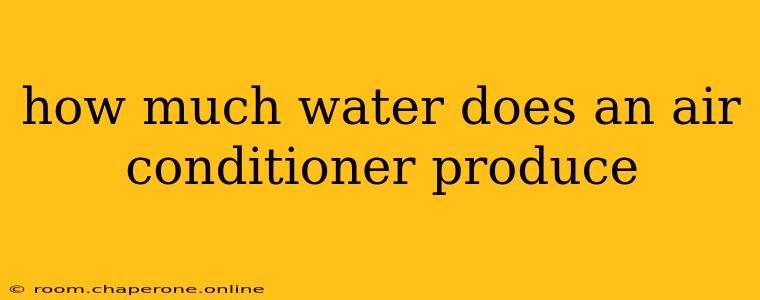Air conditioners, while keeping us cool and comfortable, also produce a surprising amount of water. This water isn't just a byproduct; understanding its source and quantity is crucial for proper maintenance and efficient operation of your system. This comprehensive guide will explore how much water your AC produces, why it happens, and what you should do about it.
The Source of AC Water: Condensation Explained
The water your air conditioner produces is a result of condensation. Here's how it works:
- Warm, humid air: Your air conditioner pulls in warm, humid air from your home.
- Cooling coils: This warm air passes over cold evaporator coils inside the unit.
- Condensation: The moisture in the air cools and condenses into liquid water on the coils.
- Drainage: This water is then collected and drained away, usually through a drain line.
Essentially, your AC acts like a giant dehumidifier, removing moisture from the air and releasing it as water.
How Much Water Does an Average Air Conditioner Produce?
The amount of water produced varies significantly depending on several factors:
- Climate: Hot and humid climates will produce considerably more water than dry climates. Higher humidity means more moisture in the air for the AC to remove.
- Air Conditioner Size and Type: Larger units and those designed for higher cooling capacities will generally produce more water. Window units tend to produce less water than central air systems.
- Usage: The more your AC runs, the more water it will produce. Continuous use during heat waves will result in significantly higher water output.
Rough Estimates: While precise figures are difficult without specific unit details and environmental conditions, here are some general estimates:
- Small window unit: Might produce a few ounces to a cup of water per day.
- Average central air system: Could produce several gallons of water per day, especially during peak usage periods.
It's important to note: These are just rough estimates. The actual amount can fluctuate greatly depending on the variables listed above.
Factors Influencing Water Production: A Deeper Dive
Let's examine the influencing factors more closely:
- Relative Humidity: This is the most significant factor. High relative humidity directly translates to more water extracted from the air.
- Temperature Difference: A larger temperature difference between the inside and outside air leads to more condensation.
- Airflow: Proper airflow over the evaporator coils ensures efficient condensation and water removal. Restricted airflow can lead to reduced efficiency and potentially even freezing.
- Unit Maintenance: A well-maintained AC unit will operate more efficiently, potentially leading to a slightly smaller water output (due to optimized cooling). Conversely, a poorly maintained system may produce more water due to reduced efficiency.
What to Do With the Water Your AC Produces
Most central air conditioning systems have a drain line that carries the condensed water away. However, understanding what to do with that water and ensuring proper drainage is vital:
- Regularly check the drain line: Ensure it’s clear and free of clogs to prevent water backup and potential damage.
- Address clogs promptly: A clogged drain line can cause serious problems, including water damage to your home.
- Inspect the condensate pump (if applicable): Some systems use a condensate pump to remove water. Regular inspection and maintenance are crucial for proper functionality.
Ignoring the water produced by your air conditioner can lead to costly repairs or even health hazards. Understanding the process, factors involved, and proper maintenance is key to ensuring your system's efficient and safe operation.
Conclusion
The amount of water your air conditioner produces is a natural byproduct of its cooling process. While the exact amount is variable, understanding the factors influencing this process and performing regular maintenance is vital for efficient and reliable operation. By addressing potential drainage issues promptly, you can prevent costly repairs and ensure your home remains comfortable and dry.

